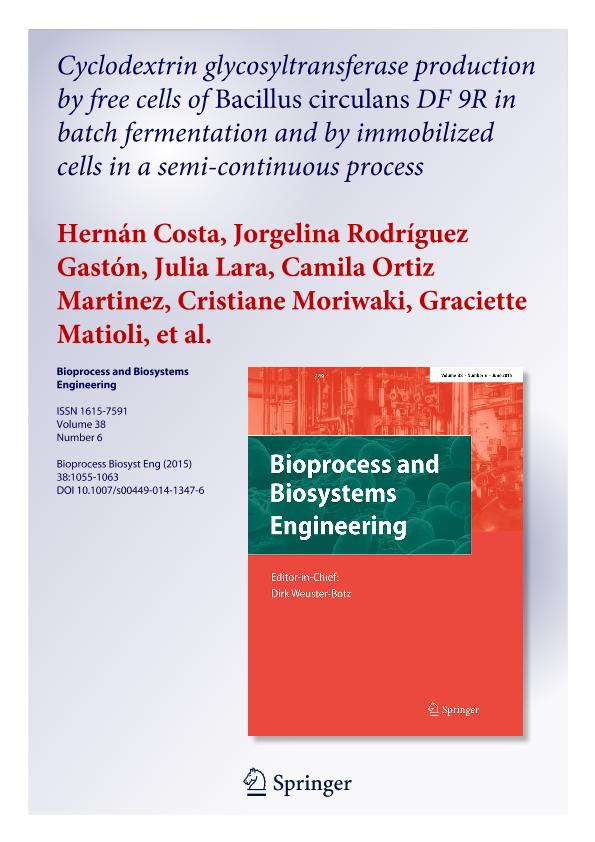Artículo
Cyclodextrin glycosyltransferase production by free cells of Bacillus circulans DF 9R in batch fermentation and by immobilized cells in a semi-continuous process.
Costa, Hernán ; Rodríguez Gastón, Jorgelina Andrea; Lara, María Julia
; Rodríguez Gastón, Jorgelina Andrea; Lara, María Julia ; Martinez Ortiz, Camila; Moriwaki, Cristiane; Matioli, Graciette; Ferrarotti, Susana Alicia
; Martinez Ortiz, Camila; Moriwaki, Cristiane; Matioli, Graciette; Ferrarotti, Susana Alicia
 ; Rodríguez Gastón, Jorgelina Andrea; Lara, María Julia
; Rodríguez Gastón, Jorgelina Andrea; Lara, María Julia ; Martinez Ortiz, Camila; Moriwaki, Cristiane; Matioli, Graciette; Ferrarotti, Susana Alicia
; Martinez Ortiz, Camila; Moriwaki, Cristiane; Matioli, Graciette; Ferrarotti, Susana Alicia
Fecha de publicación:
01/2015
Editorial:
Springer
Revista:
Bioprocess And Biosystems Engineering
ISSN:
1615-7591
Idioma:
Inglés
Tipo de recurso:
Artículo publicado
Clasificación temática:
Resumen
Cyclodextrin glycosyltransferase (CGTase) catalyzes the starch conversion into cyclic or linear oligosaccharides, important industrial products. In this work, conditions to increase the enzyme production from Bacillus circulans strain DF 9R were optimized by two systems. On one hand, free cells were grown in batch fermentation experiments conducted to optimize aeration and pH. The increased production of the enzyme was achieved with aeration of 1.5 vvm at pH regulated to 7.6 after 48 h of growth. On the other hand, bacterial cells were immobilized on vegetable and synthetic sponge and used for CGTase production in a semi-continuous process, by transferring the immobilized cells to a suitable culture medium in successive cycles. An initial biomass of 30 mg of lyophilized cells and an immobilization time of 24 h with vegetal or synthetic sponge was enough to reach the greater production of the CGTase. Sponge immobilized bacteria were re-used in 12 successive cycles, although enzyme production dropped significantly after the sixth cycle reaching around 40 % of initial enzyme activity. Even though the specific productivity was similar in both processes, the semi-continuous process has advantages compared to batch process with free cells because employed an inexpensive and biodegradable matrix, thus making the system potentially appropriate for CGTase production on an industrial scale.
Archivos asociados
Licencia
Identificadores
Colecciones
Articulos(SEDE CENTRAL)
Articulos de SEDE CENTRAL
Articulos de SEDE CENTRAL
Citación
Costa, Hernán; Rodríguez Gastón, Jorgelina Andrea; Lara, María Julia; Martinez Ortiz, Camila; Moriwaki, Cristiane; et al.; Cyclodextrin glycosyltransferase production by free cells of Bacillus circulans DF 9R in batch fermentation and by immobilized cells in a semi-continuous process.; Springer; Bioprocess And Biosystems Engineering; 1-2015; 1-11
Compartir
Altmétricas



